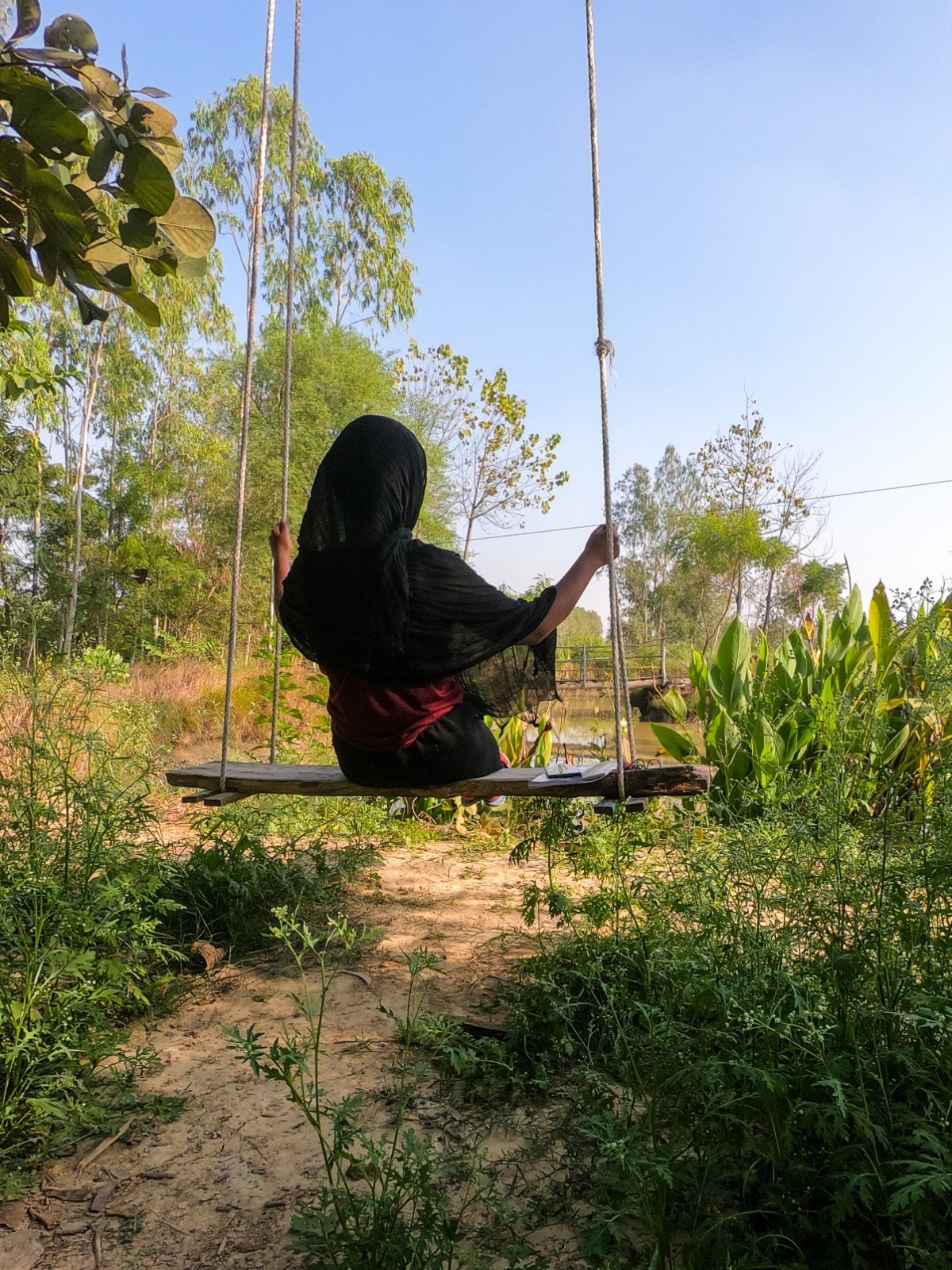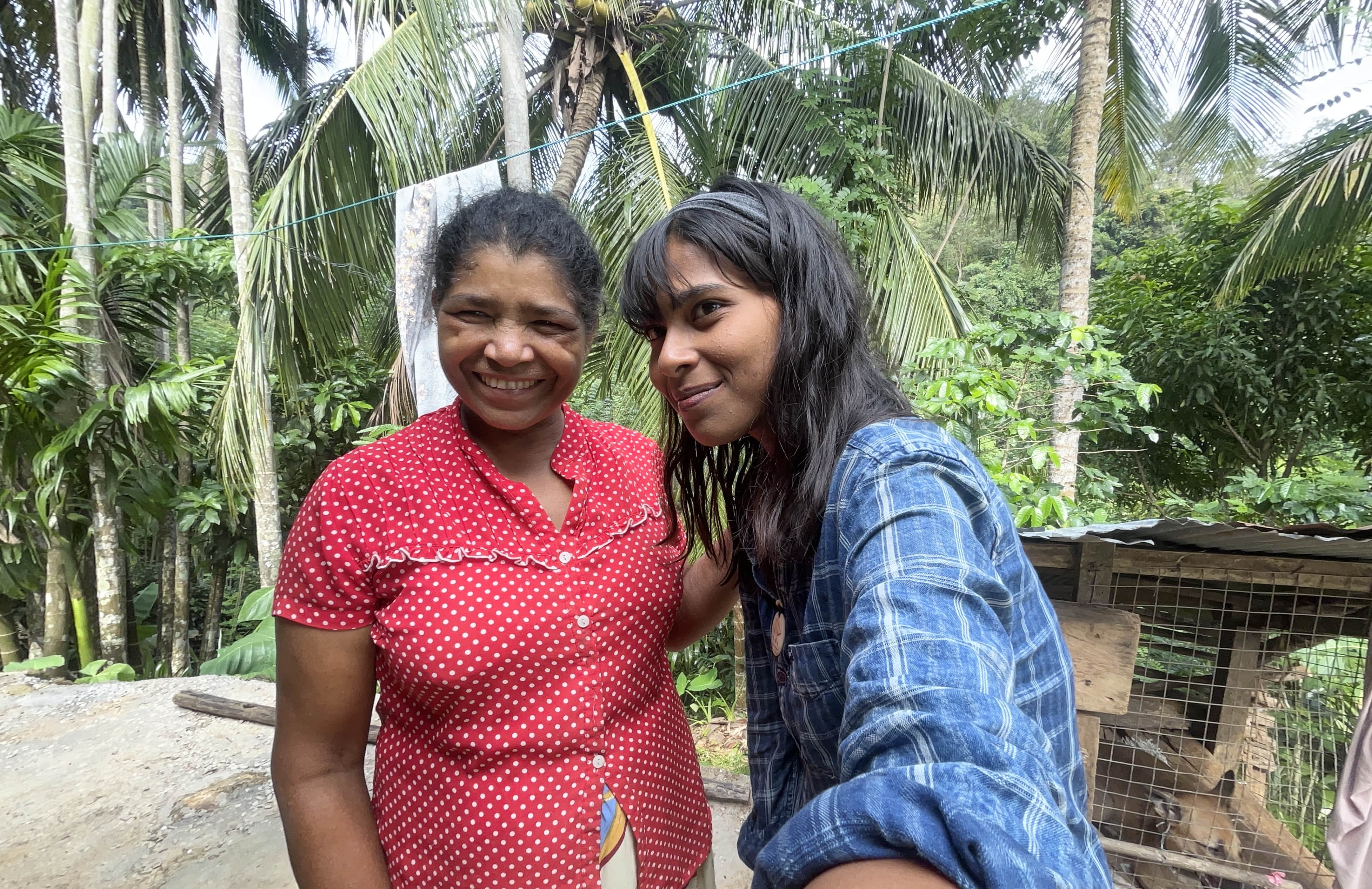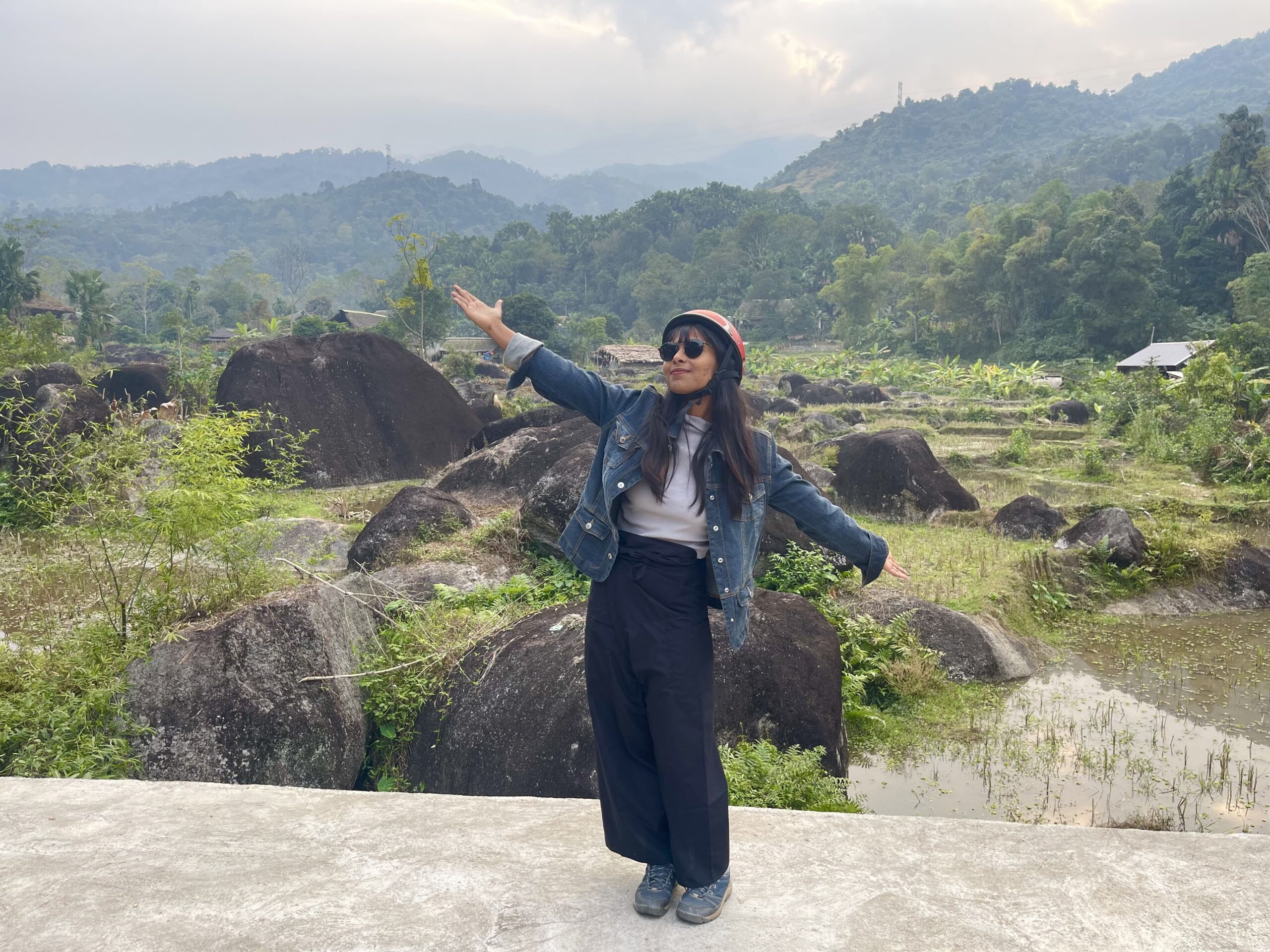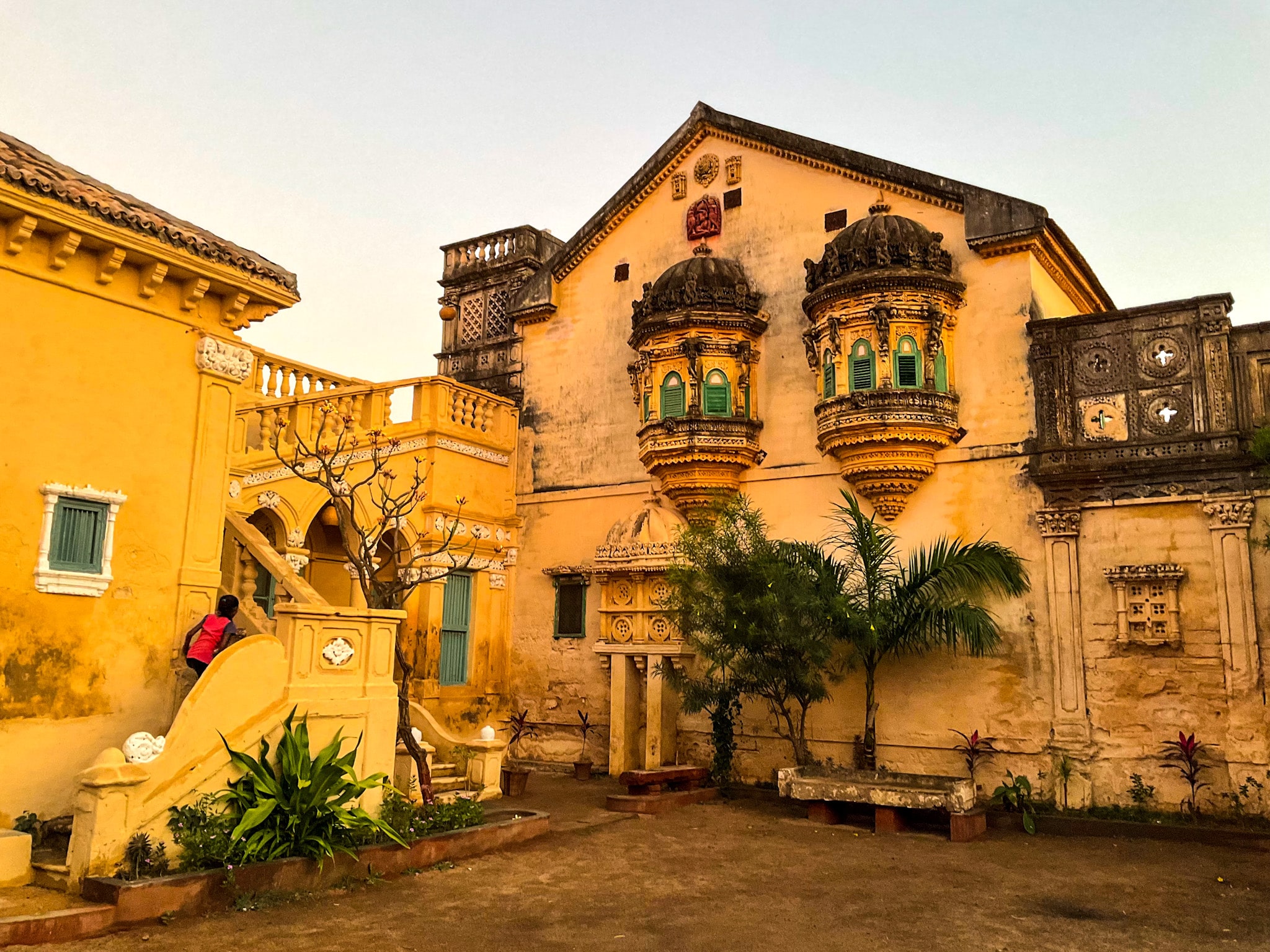Ammi, a ‘mother’. Abbu, a ‘father’. Two larger-than-life simple individuals together developed an organic farmland and later a farmstay called ‘Vintage Village’ in a remote village Gulripurwa in Uttar Pradesh. I spent 20 days teaching in their school, and knowing a calm sanctity I found solely in their repose and inspiration.
The piece of rectangular wood was hanging on the neck-strength of the white ropes. One extreme end of the knot has been tied up as far as the highest branch of the tree. With every swing backwards, blows in a windy push to the edge of the pond. And a micro-few meters, slightly-flipped backsteps, you want to let go of the strong grip and throw yourself into the water.
The Mornings at ‘Vintage Village’ the Way They Were
Ammi shouts my name from the kitchen-room at the other end. My conscience shifts from my hanging legs to Ammi’s curled-up voice. Soon I hear her feet munching on the bunk of fallen leaves on the clear path that goes straight to the thick mango-cluster. 20 acres of organic land, it can go in any direction. ‘I have made Banana Kebabs! Come and eat.’ Her words come out in a shy, procreated tune, with an innocence a child would bond with.
But she is already distracted. Distracted by the long swing. The girl in her wants to share a few swings with me. We go for long runs; longer than my guts allowed me alone, higher and higher, as our individual sides crackled in mismatched rhythms. Her up, my down; her down, my up…

Overstepping on the horizon line, a thin coat of fog has spread out on a November chilly morning at Vintage Village. A grey and encased mystery, really, just white. The disconcerted sunbeams pop up behind a resting bamboo shack on the waterfront. They are hardly visible. We get back to the main yard.
Abbu’s fingers move with two symbolic rings on the last fingers of his right hand, following the radio music that stretches out through frequencies of 90s Islam songs. The voice on the radio felt Abbu’s mornings with a concentrated and vast self-point before the namaz. He is there, in that music. Sanam, his daughter, sits by the teeming fire in a yellow scarf covering her head. The fire is slowly becoming just air.
‘Ruby!’ Abbu has always called Ammi Ruby. And Ammi often joked about him as ‘My moon’.
‘Yes. We are going for our morning walk!’
Ammi hurries past the little wood-fire in front of the outdoor dining tables. She has to ask every passer-by what is happening in their lives lately. The milk-delivery man would stop the cycle, the elderly would wave the stick, the women would ask for tea or yogurt, and Ammi would spend more time talking than walking.
Also read – The Female Beedi-Workers in the Sundarbans
Strolls around A Rural Village in Uttar Pradesh
The soft light glints on the collapsed branches in the tree congregation; in derived spaces, where light needs to be violently present to bend into the curved splits and the air beneath the first forms of leaves. Guava, lemon, Amla, bael, and jackfruit trees share a communal organic space on this farm in Uttar Pradesh.
Sugarcane bristles all the way. Miles and miles. Through my once-driven vision of a village with vast acceptance in the middle of nowhere. The ones that you see from a running train and never get down to.
A little boy comes out of a neatly-cleaned clay-hut; with a toothbrush in his mouth and drops of white paste slipping from the opposite tip of his half-ajar uncoordinated lips. His right leg is tied in a white plaster without a chappal. ‘I fell off the stairs in school’, the boy answers to Ammi’s questionable glances at his injured leg.

All the puppies, six-seven of them, try to suck the mother’s milk together and totally pin her to the ground. A woman in a red saree tries to put a wide-eyed lap-baby to sleep. Ammi gets into another chitchat, until she turns to me, ‘You know, they don’t use washrooms. I mean, the government has built one washroom for every house. But they use them as storerooms.’ The woman agrees with a flickled smile reflecting through her uneven slight-yellow teeth, as if she is eating her smile.
‘You don’t believe me? See for yourself.’ Ammi shifts the curtain of one of the outdoor washrooms, and I see huge piles of carton-boxes on top of another almost touching the ceiling, on an Indian-style toilet pan. This is a storage room!
‘For generations, these village men and women have been going to their land to relieve themselves. They have fixed timings.’
‘For what?’
‘For relieving themselves! To poop! At 6 am, they gather in groups and go to a far corner. Then again in the evening, the ladies go for another round’. It’s a system where everybody feels nature’s pressure at the exact clock-time!
‘But why don’t they use the washrooms?’
‘They don’t know how to use them. The government surely has built the washrooms, but nobody taught them how to use the toilet!’ Ammi continues. The woman nods her head in forced force at Ammi’s way. Then bursts into an open laughter.
Ammi and Abbu’s family is the only Muslim family in this Hindu-majority village in Uttar Pradesh, and the most respected; mostly because they are also the only educated family. When a villager gets sick, she comes to Abbu for medicines. Medical science in villages is more like seeing a friend. So they have stacked all kinds of medicine; for it’s not always possible to travel to Lucknow, 100 km away, or to the next-big city Sitapur. ‘The religious dilemma is mostly faced in Lucknow’, Abbu’s son Ameer tells me. In Gulripurwa, everything is in harmony, except for sudden fist-fights, you never know who started it!
Abbu tells me later, in a different conversation, ‘When someone has a job outside the village, of any kind, there’s a source of flowing money. Then they have a standard lifestyle. The rest who are dependent on the land only, they don’t have enough to sustain survival.’

The stony path continues to more awe-gatherings of villagers flocking to see ‘the outsider’ (me); the little makes and breaks, with new faces and run-out enthusiasms; new groups forming, another group going back to milking the cows or the babies. The baby and the puppy drink milk from the same bowl. Husna leans on a standing straw-bed and almost drops it.
The School And Husna
Have I not told you about Husna? She is a fourteen-year-old who seeks solitude, and my constant companion in the badminton field and spared memories of deep-throat hearings. The supremacy and commotion of Uttar Pradesh’s Capital City Lucknow are lost to her. Leaving her family behind, she made a conscious decision to help Ammi with housework at Vintage Village and study at their school. She wanted to live in fog, morning-light and duck quacks; no longer in the grueling funnel of urban undertones. She doesn’t miss her family.
Husna is getting late for school. We have to hurry back to the farm. The school is on the premises, but Husna needs time to tie up her hair in two tight braids, put on her socks, and finish cleaning up the utensils. She hopes to make it to the prayer line everyday before the first line of ‘Itna shakti hume dena data’ goes into all kinds of musical breakdowns. One kid singing in scale A, another in Scale Grumpy-Morning-Z! And Ammi trying to identify the culprits with a stick.

I stand in a corner and observe everything. The local teachers in charge of maintaining the prayer line in their formal tucked-in shirts, Ammi asking random number-charts to random children, and giving a beating to the ones who can’t answer. I know in a few minutes all these kids would get buried inside a couple of textbooks and never look up. In recess, they would garner outside my nursery classroom, where I painted the walls with my nursery kids in alphabet, numbers, mountains, and pine trees.
‘You know, they don’t use washrooms. I mean, the government has built one washroom for every house. But they use them as storerooms.’ The woman agrees with a flickled smile reflecting through her uneven slight-yellow teeth, as if she is eating her smile.
‘She is leaving her prints on the wall’, Ammi would tell the teachers. But I wasn’t, really. I didn’t know how else to create a learning environment within those four increasingly depressing underwashed walls in a half-deserted school. I had to bring in some colours. The children needed colours.
‘Earlier when the kids would come to our farm, way before Vintage Village was thought of, we used to tell them to write on the floor. That’s how their interest grew. The kids in 7th or 8th standard didn’t know how to spell their names. We arranged for a few teachers, and the guardians started to send their kids. Since there was a demand, a school needed to be made.’

After the long school hours touching the informal afternoon, I return to the empty classroom to paint; with all the children gone, nobody to spill colours with. I draw some basic structures of trees, fields, houses, a boat, a sun and an unfinished poem. The yellow brush touches the sun and I think of the peacocks.
Also read – ‘Tumaru Nau Kisso?’ – Living Rural Life in the Garhwal Region
The Nature-Abundance at ‘Vintage Village’
A family of peacocks takes silent strolls around the bushes beside the red-white wooden cottage. My window directly opens to the lawn. But, the peacocks really were eluding me, every single time! Today, I was having my daily dose of morning tea-biscuit with Ammi complaining about someone who stole their paper cups, and the peacocks came. Unbound and present!
‘Back then, there was no road. We used to run through the meadows to this barren and infertile land; the kind of land where nothing grows. All this was just sitting there. We took it as a challenge. The land had stayed with us for generations, it was time to use it properly, in a way that’s healthy to the environment and humankind.’ Abbu had a vision at 17 about a sustainable space he could call ‘vintage’.

Her green bangles shake up with the mustard seeds drying up for oil. Just by my door, this woman from the village wobbles the seeds once to the right, again to left. A local man asks me, ‘Don’t you Bengalis turn your husbands into goats after marriage?’ At first I thought he was joking. But he was rather serious. ‘We were always told that’, He mixes sugarcane juice with dry ginger, carom seeds and coconut flakes in a big hot cauldron; the organic jaggery they sell in Lucknow Farmers Market.
Sugarcane bristles all the way. Miles and miles. Through my once-driven vision of a village with vast acceptance in the middle of nowhere. The ones that you see from a running train and never get down to. That was my first impression of Gulripurwa. I must have seen it from a train. And there stood Ammi, a little girl in red Kamiz, for whom a boy once fell in love just seeing the back of her palm.
It is indeed so nostalgic thinking about Ammi and Abbu almost after two years, the incredible fortune of getting to know Uttar Pradesh in its rural truth and false blames, and the honest sugarcane fields of ‘Vintage Village’.
I’d highly encourage you to stay or volunteer at this farmstay in Uttar Pradesh!
Support my solo adventures around the globe by joining the Patreon community!
Live the Adventure!
Get weekly articles delivered to your doorstep and stay up-to-date with my new travel stories for free.





Leave a Reply